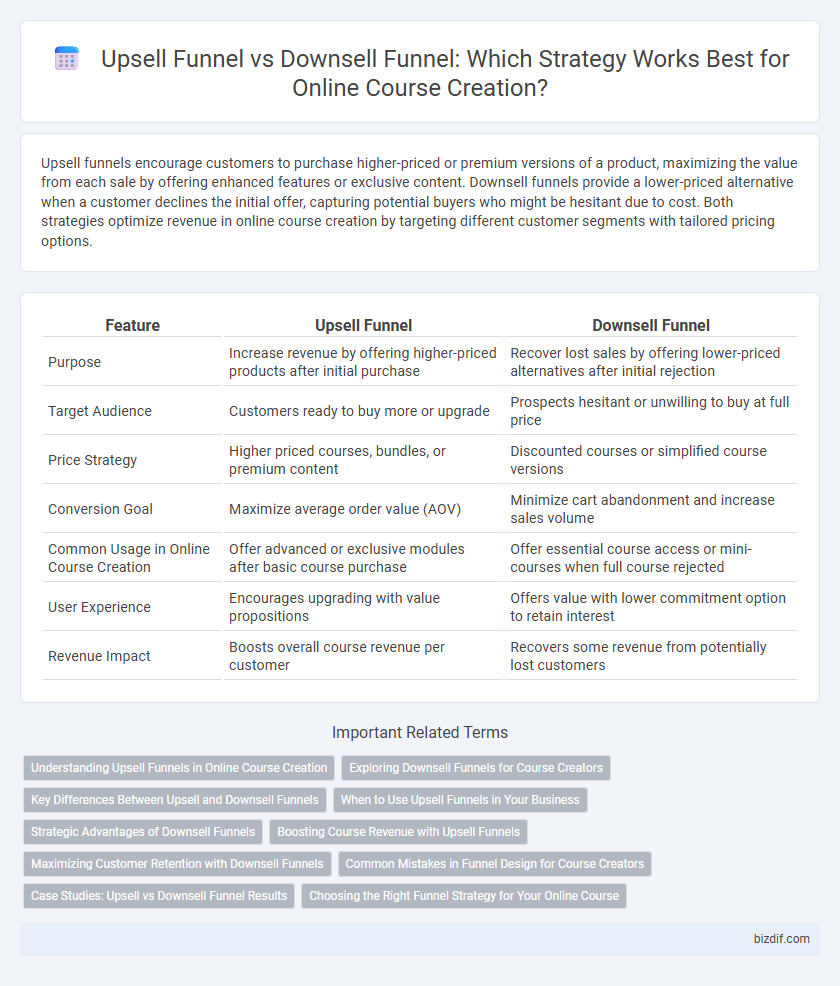Upsell funnels encourage customers to purchase higher-priced or premium versions of a product, maximizing the value from each sale by offering enhanced features or exclusive content. Downsell funnels provide a lower-priced alternative when a customer declines the initial offer, capturing potential buyers who might be hesitant due to cost. Both strategies optimize revenue in online course creation by targeting different customer segments with tailored pricing options.
Table of Comparison
| Feature | Upsell Funnel | Downsell Funnel |
|---|---|---|
| Purpose | Increase revenue by offering higher-priced products after initial purchase | Recover lost sales by offering lower-priced alternatives after initial rejection |
| Target Audience | Customers ready to buy more or upgrade | Prospects hesitant or unwilling to buy at full price |
| Price Strategy | Higher priced courses, bundles, or premium content | Discounted courses or simplified course versions |
| Conversion Goal | Maximize average order value (AOV) | Minimize cart abandonment and increase sales volume |
| Common Usage in Online Course Creation | Offer advanced or exclusive modules after basic course purchase | Offer essential course access or mini-courses when full course rejected |
| User Experience | Encourages upgrading with value propositions | Offers value with lower commitment option to retain interest |
| Revenue Impact | Boosts overall course revenue per customer | Recovers some revenue from potentially lost customers |
Understanding Upsell Funnels in Online Course Creation
Upsell funnels in online course creation focus on offering higher-value or advanced courses immediately after the initial purchase, enhancing customer lifetime value and boosting revenue. These funnels strategically present relevant, premium content tailored to the learner's progress and interests, increasing the likelihood of additional sales. Effective upsell funnels leverage email marketing and personalized landing pages to guide students smoothly from basic to advanced offerings.
Exploring Downsell Funnels for Course Creators
Downsell funnels offer course creators a strategic opportunity to recover potential lost sales by presenting lower-priced or simplified course options to prospects who decline the initial offer. By implementing targeted downsell funnels, creators can effectively increase conversion rates and maximize revenue per visitor through tailored, value-driven alternatives. Analyzing customer behavior and segmenting audiences enables the design of personalized downsell pathways, improving engagement and long-term customer retention in the competitive online education market.
Key Differences Between Upsell and Downsell Funnels
Upsell funnels encourage customers to purchase higher-tier products or complementary services by offering enhanced value and premium features after the initial sale, increasing average order value. Downsell funnels target prospects who decline the original offer, presenting lower-priced or simplified alternatives to capture revenue that might otherwise be lost. The key difference lies in their strategic goals: upsell funnels maximize customer spend with premium options, whereas downsell funnels minimize churn by offering affordable alternatives.
When to Use Upsell Funnels in Your Business
Upsell funnels are most effective immediately after a customer's initial purchase when their buying intent is at its peak, allowing businesses to offer higher-value or complementary products. Use upsell funnels to increase average order value by presenting premium course bundles, exclusive modules, or one-on-one coaching sessions. Implementing upsell strategies in online course creation boosts revenue and enhances customer lifetime value by deepening engagement with relevant, timely offers.
Strategic Advantages of Downsell Funnels
Downsell funnels enhance customer retention by offering tailored, lower-priced alternatives to hesitant buyers, increasing overall conversion rates and reducing cart abandonment. They strategically capture revenue from leads unwilling to commit to premium offers, maximizing lifetime customer value. Implementing downsell funnels supports scalable growth by nurturing trust and providing flexible purchasing options aligned with diverse customer budgets.
Boosting Course Revenue with Upsell Funnels
Upsell funnels significantly boost course revenue by offering higher-tier products or exclusive content to existing customers, increasing average transaction value. These funnels leverage targeted messaging and personalized product recommendations to maximize conversions and customer lifetime value. Compared to downsell funnels, upsell strategies focus on enhancing profits through premium offerings rather than compensating for lost sales.
Maximizing Customer Retention with Downsell Funnels
Downsell funnels play a crucial role in maximizing customer retention by offering alternative products or lower-priced options when customers decline the initial upsell, preventing complete loss of interest. These funnels maintain engagement and build trust by providing value aligned with customer budget and needs, enhancing the likelihood of future purchases. Effective downsell strategies increase overall customer lifetime value and reduce churn in online course creation.
Common Mistakes in Funnel Design for Course Creators
Course creators often mistake upsell funnels for guaranteed revenue boosters, neglecting to segment their audience effectively, which leads to irrelevant offers and poor conversion rates. Downsell funnels frequently suffer from unclear value propositions, causing potential buyers to perceive the lower-priced offer as less valuable or a compromise. Both funnel types fail when course creators overlook customer journey mapping, resulting in misaligned messaging and weakened buyer trust.
Case Studies: Upsell vs Downsell Funnel Results
In online course creation, case studies reveal that upsell funnels typically generate 30-40% higher revenue per customer by offering premium content or bundled courses immediately after the initial purchase. Downsell funnels, which present more affordable alternatives when prospects decline the upsell, often achieve conversion rates up to 25% by capturing price-sensitive buyers who might otherwise abandon the funnel. Comparing both, upsell funnels maximize customer lifetime value, while downsell funnels increase overall conversion volume, making a combined approach the most effective strategy for maximizing course sales.
Choosing the Right Funnel Strategy for Your Online Course
Choosing the right funnel strategy for your online course hinges on understanding your audience's buying behavior and price sensitivity. An upsell funnel focuses on increasing average order value by offering premium features or advanced modules after the initial purchase, ideal for high-value customers. In contrast, a downsell funnel presents lower-priced alternatives to hesitant buyers, maximizing conversions and reducing cart abandonment by catering to budget-conscious learners.
Upsell Funnel vs Downsell Funnel Infographic

 bizdif.com
bizdif.com